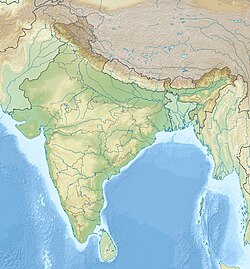
Back Amritsar Afrikaans أمريتسار Arabic مدينه امريتسار ARZ Amritsar Azerbaijani امریتسار AZB Амрытсар Byelorussian Амритсар Bulgarian अमृतसर Bihari অমৃতসর Bengali/Bangla অমৃতসর BPY
Amritsar
Amr̥tasara | |
|---|---|
| Nicknames: Nicknames
| |
| Coordinates: 31°38′N 74°52′E / 31.64°N 74.86°E | |
| Country | |
| State | |
| District | Amritsar |
| Founded by | Guru Ram Das |
| Government | |
| • Type | Municipality |
| • Body | Amritsar Municipal Corporation |
| • Mayor | Karamjit Singh Rintu (AAP) |
| • Deputy Commissioner | Sakshi Sawhney[1] |
| Area | |
• Total | 139 km2 (54 sq mi) |
| • Rank | 2nd in Punjab |
| Population (2011) | |
• Total | 1,159,227 |
| • Density | 8,300/km2 (22,000/sq mi) |
| • Metro rank | 44th |
| Demonym(s) | Amritsariya, Ambarsariya,[3] Amritsari |
| Time zone | UTC+5:30 (IST) |
| PIN | 143-001 |
| Telephone code | 91 183 XXX XXXX |
| Vehicle registration | PB-01 (commercial vehicles), PB-02 |
| Website | www |
Amritsar (Punjabi: [əmːˈɾɪtsəɾ] ⓘ; ISO: Amr̥tasara), historically also known as Rāmdāspur and colloquially as Ambarsar,[5][6] is the second-largest city in the Indian state of Punjab, after Ludhiana. Located in the Majha region, it is a major cultural, transportation and economic centre. The city is the administrative headquarters of the Amritsar district. It is situated 217 km (135 mi) north-west of Chandigarh, and 455 km (283 mi) north-west of New Delhi. It is 28 km (17.4 mi) from the India-Pakistan border, and 47 km (29 mi) north-east of Lahore, Pakistan.
According to the 2011 census, the city had a population of 1,132,383. It is one of the ten municipal corporations in the state; Karamjit Singh Rintu is serving as the mayor of the city.[7] According to the United Nations, as of 2018, Amritsar is the second-most populous city in Punjab and the most populous metropolitan region in the state, with a population of roughly 2 million. Amritsar is the centre of the Amritsar Metropolitan Region.
Amritsar is the economic capital of Punjab. It is a major tourist centre with nearly a hundred thousand daily visitors. The city has been chosen as one of the heritage cities for the Heritage City Development and Augmentation Yojana (HRIDAY) program of the Government of India.[8] It is home of the Golden Temple, one of Sikhism religion's most spiritually significant and most-visited gurudwaras. The city is also known for Amritsari food, and wooden chessboards and the chess pieces manufacturing industry.[9]
- ^ "Sakshi Sawhney becomes first woman deputy commissioner of Amritsar: A aistoric appointment". The Times of India. 15 September 2024. Retrieved 17 September 2024.
- ^ "Amritsar City" (PDF). Archived (PDF) from the original on 2 July 2023. Retrieved 23 November 2020.
- ^ Vishveshvaranand Indological Journal. Vishveshvaranand Vedic Research Institute. 1981. p. 66.
- ^ "District Census Handbook: Amritsar" (PDF). censusindia.gov.in. Registrar General and Census Commissioner of India. 2011. Archived (PDF) from the original on 9 January 2024. Retrieved 9 January 2024.
- ^ Indian Studies: Past and Present. Vol. 3. Ramakrishna Maitra. 1962. p. 192.
Amritsar, the principal place of Sikh worship, was not established at Ram-Raoni, but, in fact, Ram-Raoni was established near the Sikh place of worship at Amritsar (called Ambarsar by illiterate people), which had been founded by Guru Ramdas in 1574, one hundred and seventy-four years before the Ram-Raoni came into existence.
- ^ Madra, Amandeep Singh; Singh, P. (2016). Sicques, Tigers or Thieves: Eyewitness Accounts of the Sikhs (1606-1810). Springer. p. 86. ISBN 9781137119988.
Amritsar (q.v.), the city that includes the Harimandar Sahib Temple complex, was not established at Ram-Raoni (q.v.), as stated by Polier, which is nearby. Amritsar, pronounced Ambarsar by unlettered rural dialects of Punjab, was founded by Guru Ramdas (q.v.) in 1574, 174 years before the Ram-Raoni developed. The town had earlier been called Ramdaspur, Chakk Ramdas, or simply Chakk Guru (q.v.), and was marked as such in eighteenth-century maps of the area.
- ^ "List of Municipal Corporation in Punjab". www.punjabdata.com. Archived from the original on 14 January 2018. Retrieved 28 January 2018.
- ^ "Introduction". HRIDAY official website. Archived from the original on 26 August 2015. Retrieved 30 April 2015.
- ^ Bagga, Neeraj (6 September 2018). "Permit raj checkmates chessboard industry". The Tribune. Archived from the original on 28 April 2019. Retrieved 27 April 2019.










